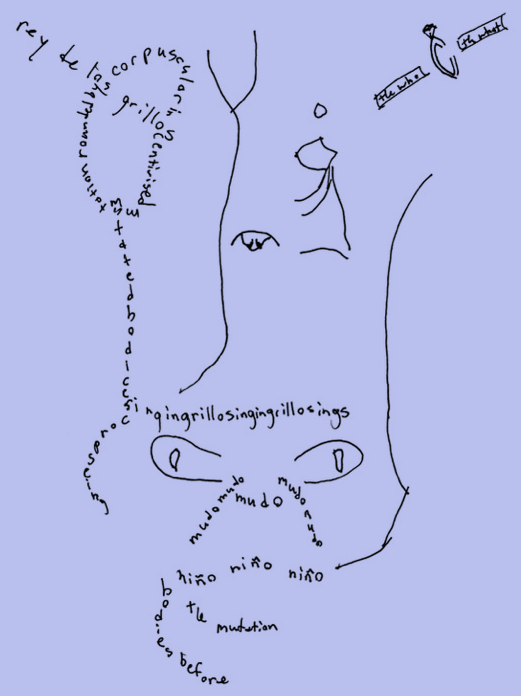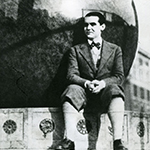from The Lorca Book
Hid himself in letters
Stand up and become human, he said
I’m laid down in letters
He wanted an audience of sex and death
An orgy laid down in letters
He dragged danger like daggers clatter across steel sheets
His danger covered the stage in letters
Absurd, his shadow a flitting pose of blood,
He hid himself in death.
There was danger in his sheets,
Two bullets in his bu[m]hole (sic.)
For being queer, it was said.
He lay down in a letterless grave;
Buried outside of letters, his shadow flitting dangerous.
The letters just didn’t become human
His audience a thin mask of letters
Jets of blood absurd jets of confetti
Four horsemen no four men in suits
He wanted an audience of sex and death
I’m laying him in letters
When we cry for jets of blood
Instead of death in cubicles and jail cells
The IRS and the FBI
Hear me hear our shadows flitting
The letters don’t work
He broke bread like Jesus bleeding in childhood
saying his prayers listening like someone was listening
Asking for his jet of blood
Proof of living (IRS letter box)
Is he listening to me now?
Letters never work
We want real REAL lemons
THIS LEMON THAT LEMON
POETRY IS SHIT PILES OF LEMONS ON A STOOP
BASKETS OF BLOOD SOURED
WE WANT REAL SHIT
Jets of death
Solid living lemons
I can lay down with
Because you touched me
Because I am grabbable gravable buryable
This is evidence
A real body in letters
(Or maybe these letters
(Look look the letters
Are failing
(
The Silent boy
The little boy looks for his voice.
(The King of the Crickets had it.)
In a droplet of water,
The little boy looked for his voice.
I don’t want it for speaking.
With her, I will myself make a ring
That will carry my silence
On your tiny little finger.
Far away, the voice is caught
Putting on a cricket’s garb.
first and mutely
mute sing spring
of grasshoppers’ bodies
first before the mutation
loud bodies corpseing
before the first corporeal
mutation
corpse of grasshoppers sing
The corpus
body of mutated boys
sings first
grasshoppers’ king
bodice
The mute boy’s
primavera
first
mutated
bodice
primera
mudo
corpus

Before
the first corporeal mutation,
the body of loud bodies sings:
first king of grasshoppers’ bodies,
loud corpus of grasshoppers sing.
Mutely, boys before the first corpus,
the body of grasshoppers sing.
Mutation before the first king,
the corpse of grasshoppers sing.
Before mutation, the body feeds mutely
the grasshopper wings,
so he may sing
through the corpus of
grasshopper kings
before the first mutation
the body feeds the boy
the mute bodice, king
first boy sing
(the king of crickets had it)
el primer hombre
la pintura de las alas
comiendo el muchacho
cuerpo en cuerpo,
rey en el rey
Translator’s Note:
I’ve been translating Lorca’s work for over 10 years, and I have recently begun an experimental project channeling the poet himself. Channeling is a form of translation, and over the course of becoming a “Lorca translator,” which I call myself rather than a “Spanish translator,” I’ve come to think of these praxes as the same. In translation and in channeling, I am listening. Lorca is a queer ancestor, and so I try to listen to his work and divine my own place in relation to it, which means placing myself and my text. Just as with translation, using channeling results in mistakes and misreadings which, I think, can be strong interpretations all the same.
My project of mistranslating Lorca by channeling is under the working title “The Lorca Book” in homage to Robert Duncan’s H.D. Book. Both are in direct communication with forebears who share formal praxes and identities with the author-medium. Through ritual and invocation, Lorca became a sounding board and a mask for my author self, and throughout the book, we converse in the margins—which I think is what any translation is formed from, whether the translator chooses to hide the conversation or not.

Federico García Lorca (1898–1936) was a Spanish poet and playwright who, in a career that spanned just 19 years, engaged and revitalized Spanish poetry and theatre by fusing tradition with modernism. Lorca’s most well-known works include the poetry collection Poeta en Nueva York (Poet in New York) and the “rural dramas”* Bodas de sangre (Blood Wedding), Yerma (Barrens), and La casa de Bernarda Alba (Bernarda Alba and her House). He was executed by a Spanish nationalist firing squad in the first months of the Spanish Civil War. Photo: Federico García Lorca at Columbia University, 1929. Courtesy of the Fundación Federico García Lorca.
*English titles are translated by Shoemaker.

Robert Eric Shoemaker is a poet and interdisciplinary artist. Eric is the author of Ca’Venezia(2021, Partial Press), We Knew No Mortality(2018, Acta Publications), and 30 Days Dry(2015, Thought Collection Publishing). His poetry, translations, and essays have been published in Rattle, Jacket2, Signs and Society, Asymptote, Entropy, Gender Forum, Exchanges, and others. Eric earned a PhD from the University of Louisville and an MFA from Naropa University. He is the digital archive editor at the Poetry Foundation. Photo by Sally Blood.

 BACK TO ISSUE
BACK TO ISSUE